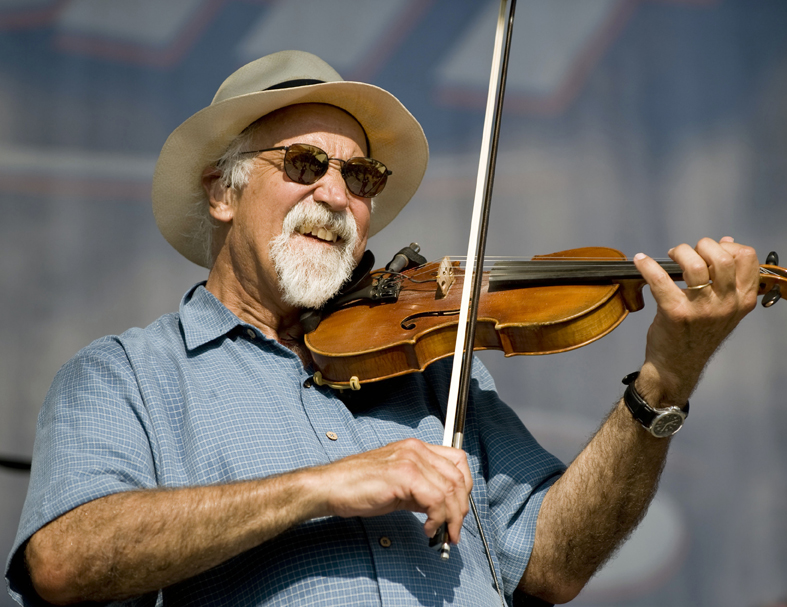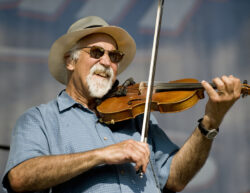BeauSoleil avec Michael Doucet
Formed during the Cajun revival of the 1970s, BeauSoleil and its founder, fiddler Michael Doucet, are among Louisiana's most prominent ambassadors of Cajun music and culture.

Courtesy of Cajun and Zydeco Photos, David Simpson.
2009 color photograph of Cajun musician Michael Doucet.
Formed during the Cajun revival of the 1970s, BeauSoleil and its founder, fiddler Michael Doucet, are among Louisiana’s most prominent ambassadors of Cajun music and culture. The band is particularly known and respected for emphasizing a wide range of Cajun musical traditions. Never content to recreate precise historical renderings of traditional Cajun music, BeauSoleil highlights the music’s inherent adaptability by incorporating elements of zydeco, blues, swamp pop, traditional New Orleans jazz, calypso, country, western swing, and rock and roll. Having recorded more than two dozen albums, BeauSoleil has received eleven nominations and two Grammy awards.
Origins and Influences
The origins of BeauSoleil lie in the experiences of its founder, Michael Doucet. Born in Lafayette Parish on February 14, 1951, he is the son of Louis Pierre Doucet and Mary Frances Leblanc Doucet. Raised in an extended family full of amateur and professional musicians, Doucet began playing banjo at age six and guitar at age eight. His uncle Will Knight played Cajun fiddle, banjo, and bass, and was particularly influential. His grandmother learned about the family’s Acadian and French roots while serving as a nurse in France during World War I (1914–1918), and his mother was an avid student of the French oral tradition of storytelling. As a teen, Doucet and his cousin Zachary Richard formed a contemporary folk-rock band, the Bayou Drifters. In 1974, a music promoter hired the band to play at a folk music festival in France, sparking Doucet’s interest in the origins of Cajun music.
On his return to Louisiana, Doucet threw himself into an investigation of Cajun traditions and explored ways of translating them for contemporary audiences. With a 1975 Folk Arts Apprenticeship grant from the National Endowment for the Arts (NEA), he set about meeting and learning from as many traditional Cajun musicians as he could. Dewey Balfa, Sady Courville, Varise Connor, Freeman Fontenot, Luderin Darbone, Hector Duhon, Doc Guidry, Bébé Carriere, Lionel LeLeux, and Dennis McGee were among those he studied. At the same time, he helped form Coteau, a folk-rock band that played a traditional French Cajun repertoire while utilizing twin electric lead guitars. The group became popular enough along the Louisiana Gulf Coast to attract increasingly larger young audiences, and, as a result, began to reenergize the local music scene.
As a side project, in 1975 Doucet formed a small acoustic ensemble dedicated strictly to the performance of traditional Cajun music. He named this endeavor BeauSoleil in an apparent double entendre. Although BeauSoleil translates as “beautiful sun,” it was also a nickname for Joseph Broussard, a legendary leader of the Acadian resistance movement in mid-eighteenth-century Canada. For Doucet, this covert allusion had a personal significance as well, since his mother’s side of the family included generations of Broussards.
Frustrated by their inability to negotiate a major recording contract, the members of Coteau parted ways in the late 1970s, and BeauSoleil became Doucet’s primary musical focus. In addition to Doucet, the band included David Doucet (Michael’s brother) on guitar and vocals, Jimmy Breaux on accordion, Mitchell Reed on fiddle and bass, Tommy Alesi on drums, and Billy Ware on percussion. In 1977, the band recorded its first album, The Spirit of Cajun Music, on Swallow Records. The Rolling Stone Encyclopedia of Rock & Roll described it as “an eclectic mix of blues, ballads, standards, and traditional music.”
Musical Style
The band’s unique combination of musical innovation and tradition reflected Doucet’s own instincts and previous experiences. His apprenticeships with Dennis McGee, a Cajun fiddler heavily influenced by French musical traditions, and Canray Fontenot, a Creole musician who incorporated elements of Afro-Caribbean culture, proved particularly influential. For Doucet, musical traditions were dynamic rather than static; he understood that folk music had absorbed multiple influences over centuries and believed it must continue to do so in order to remain alive and relevant. “Everything I play I learned from Louisiana,” he told Fiddler Magazine interviewer Niles Hokkanen. “I went back in time—not only to French music, but to blues, jazz, popular music, Irish music, whatever was there. As more old records are brought to light, you can see those influences and what a hotbed Louisiana was … so, my influences are the spectrum of Louisiana music.”
A confluence of events in the mid-1980s brought BeauSoleil’s innovative traditionalism to the world’s attention. First, tracks from the band were included in two movie soundtracks: Belizaire the Cajun (1986) and The Big Easy (1987). In addition, BeauSoleil became regular guests on the National Public Radio variety show Prairie Home Companion. Finally, in 1986 the band signed a deal with Rounder Records, assuring them national distribution and greater mainstream exposure. Between 1987 and 1997, the band released a dozen albums, and in 1988, they appeared as guest artists on Talk Is Cheap, a solo effort by Rolling Stones lead guitarist Keith Richards. Two years later, country-folk artist Mary Chapin Carpenter made reference to the band in her song “Down at the Twist and Shout,” which rose to number two on Billboard magazine’s country-music sales charts.
National recognition became a powerful catalyst for experimentation. BeauSoleil’s 1987 Rounder release, Bayou Boogie, featured guest artist Sonny Landreth, a southwestern Louisiana native who had developed an electric guitar style that seamlessly combined fingered chords with slide guitar effects. The band’s 1989 follow-up, Bayou Cadillac, featured zydeco, traditional Cajun, blues, traditional New Orleans jazz, and calypso, as well as original compositions and a medley that combined Buddy Holly’s “Not Fade Away,” the Bo Diddley anthem “Bo Diddley,” and the New Orleans Mardi Gras Indian-inspired “Iko Iko.” Rolling Stone critic Steven Pond described the album as “world music, south-Louisiana style,” and over the next twenty years BeauSoleil would release a half-dozen top twenty hits on Billboard’s World Music Album sales chart.
The band’s studio output slowed considerably in the first decade of the twenty-first century, but BeauSoleil is still regarded as “an American institution,” as musician/music journalist James Christopher Monger observed in a review of their 2009 Grammy-nominated release, Alligator Purse. Numerous organizations have also honored Doucet’s contribution to traditional Cajun music. The NEA honored him with a National Heritage Fellowship in 2005. In addition, the United States Artists, a nonprofit organization formed in 2005 to encourage the careers of American artists through noncommercial financial support, awarded him a fellowship in 2007. In the eyes and ears of many, BeauSoleil remains a bellwether of Cajun excellence and a musical phenomenon that People magazine once described as “Louisiana’s hottest export since Tabasco Sauce.”
